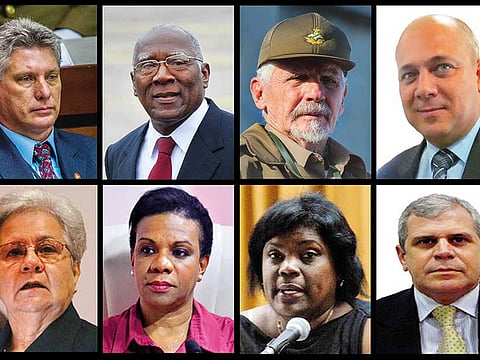Diaz-Canel is Cuba's new president as Castro steps aside
As head of Communist Party, Castro will still be the most powerful person in Cuba for the time being

HAVANA: A 57-year-old bureaucrat replaced Raul Castro as the president of Cuba yesterday, launching a new political era as a government led by a single family for six decades tries to ensure the long-term survival of one of the world’s last communist states.
The National Assembly announced that Miguel Mario Diaz-Canel Bermudez had been approved as the sole candidate for president.
The 86-year-old Castro will remain head of the Communist Party, which is designated by the constitution as “the superior guiding force of society and the state”. As a result, he will still be the most powerful person in Cuba for the time being.
Outgoing president Raul Castro (left) and incoming leader Diaz-Canel in Havana. AFP
Symbolically charged
His departure from the presidency is nonetheless a symbolically charged moment for a country that has been under the absolute rule of one family since the revolution — first by revolutionary leader Fidel Castro and, for the last decade, his younger brother.
Facing biological reality but still active and apparently healthy, Raul Castro is stepping down as president in an effort to guarantee that new leaders can maintain the government’s grip on power in the face of economic stagnation, an ageing population and increasing disenchantment among younger generations.
“I like sticking with the ideas of President Fidel Castro because he did a lot for the people of Cuba, but we need rejuvenation, above all in the economy,” said Melissa Mederos, a 21-year-old schoolteacher. “Diaz-Canel needs to work hard on the economy, because people need to live a little better.”
Most Cubans know their first vice-president as an uncharismatic figure who until recently maintained a public profile so low it was virtually nonexistent. That image changed slightly this year as state media placed an increasing spotlight on Diaz-Canel’s public appearances, including remarks to the press last month that included his promise to make Cuba’s government more responsive to its people.
“We’re building a relationship between the government and the people here,” he said then after casting a ballot for members of the National Assembly. “The lives of those who will be elected have to be focused on relating to the people, listening to the people, investigating their problems and encouraging debate.”
Technocrat
Diaz-Canel gained prominence in central Villa Clara province as the top Communist Party official, a post equivalent to governor. People there describe him as a hard-working, modest-living technocrat dedicated to improving public services. He became higher education minister in 2009 before moving into the vice-presidency.
Sign up for the Daily Briefing
Get the latest news and updates straight to your inbox



